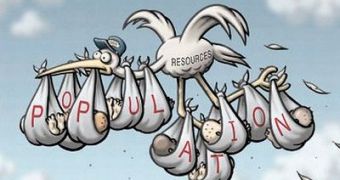At the end of 18th century Malthus has put forward a famous doomsday argument: population tends to increase exponentially while food supply increases only linearly; therefore, as human population increases, it becomes overwhelmed by famine.
This has been a very influential idea and many people argued in favor of birth controls and various measures to limit the growth of population. Some even presented the absurd idea that wars are a natural and unavoidable outcome of the "Malthusian trap".
However, more and more empiric evidences show that the Malthusian predictions, at least in some places in the world, are totally false. For example Europe's population during the 19th century more than doubled and during the 20th century almost doubled again (in the face of two world wars, the Holocaust, and an influenza pandemic which wiped out millions of people). But despite this population growth Europe isn't starving at all, on the contrary, Europeans are increasingly fat.
However, in other places, such as post-1950s India, the introduction of modern medication saved countless lives but in the same time ruined the country economically and only recently it started to improve.
So, why the difference? Why is Malthus' argument sometimes so utterly false? In what conditions is it false? This question bears some relevance today as we have recently reached a population of 6.5 billion and the most recent UN predictions are that we will be more than 9 billion by 2050.
The answer to the Malthusian trap isn't very difficult, but many still don't know it.
Part of the answer is that population obviously doesn't grow exponentially. People are not like rats or like Drosophila - they are not using all the resources available to them to have more children; they use some of the resources to improve their personal condition, to have more fun, to travel etc. In other words people are not simply slaves of their genes and they don't exist simply to multiply. This isn't just an "idealistic" and optimistic view of humanity, it's simply empiric fact. For example people in Europe have so few children that, if it weren't for the immigrants, the population would decrease.
But the other part of the answer is the really important one. Unfortunately, the answer is controversial, so many people feel a need to reject it on political grounds - although it doesn't have anything to do with politics in itself, it's just plain economics.
A small detour
It is worth noting that Malthus' economic theory (although flawed as economic theory) was instrumental to the creation of the evolution theory. Both Darwin and Wallace saw Malthusian struggle for existence taking place in nature and shaping the biological evolution. The idea is that in nature resources are limited and animals have to compete to get the resources. Natural evolution springs out of this competition for limited resources.
Once Darwinian Theory was in place, many believed that the capitalist competition was itself a Darwinian competition. However, this is exactly the economic error of Malthus. While in nature there is a competition among consumers for resources, in the capitalist system there is a competition among producers for consumers. It's the exact opposite of Darwinian competition! (By the way, this was underlined for the first time by the Austrian economist Ludwig von Mises.)
What a producer does is to take some things which are not useful in themselves and to transform them into some other things which are useful. A producer transforms some things people don't want to buy into things people want to buy. In other words, in the capitalist system, the number of available resources (such as food or computers) grows. But the speed of this growth is depended precisely on the number of people. The population growth and the food supply growth are not independent of each other.
Out of the trap
But there is more. The point is that the competition among producers isn't in fact a competition among people, it's a competition among ideas - more precisely, it's a competition among different ways of organizing production. The most efficient ways of production eliminate the other ones - this is what really happens, it's not people eliminating other people, because a producer seeing that he or she remains behind the competitors usually adopts the very ways of organizing production his competitors employ. (Of course, patent laws hamper this, and turn the competition among ideas into a competition among people - which happens in the courthouses and not on the market. This is exactly why patent laws should be eliminated.)
The bottom-line is that capitalist competition leads to an increase in the productivity. This is why in capitalist countries, instead of starvation, as Malthusians predicted, there is widespread prosperity. And this is why, on the other hand, socialist countries, such as post-1950s India, had fallen into the Malthusian trap.
So, the point is that in the presence of a free-market system the population does not grow exponentially and the food supply does not increase linearly - on the contrary, the food supply (as well as everything else) grows faster than the population growth.
"Adding more people causes problems. But people are also the means to solve these problems," wrote Julian L. Simon in The State of Humanity. "The main fuel to speed the world progress is our stock of knowledge; the brakes are our lack of imagination and unsound social regulations of these activities. The ultimate resource is people - especially skilled, spirited, and hopeful young people endowed with liberty - who will exert their wills and imaginations for their own benefit, and so inevitably they will benefit the rest of us as well."
Cartoon by Roedy Green. Picture: Thomas Malthus.

 14 DAY TRIAL //
14 DAY TRIAL // 
